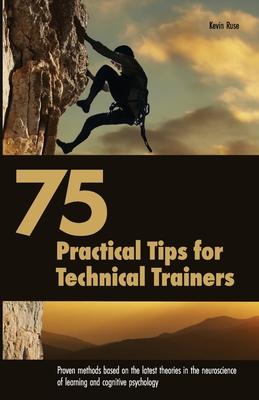
Book
75 Practical Tips for Technical Trainers: Proven methods based on the latest theories in the neuroscience of learning and cognitive psychology
by Kevin Ruse
(Write a Review)
Paperback
$25.00
You'll understand how people learn and how to teach, so the learning sticks. Based on the latest theories in the neuroscience of learning and his own on-the-job experiences, Kevin walks you through the best ways to engage your students. You'll learn to implement spaced repetition, practiced retrieval, and interleaving. Chapter one is a brief overview of what happens to your learners while you teach, and it forms the foundation for the tips in the book. You'll understand why end-of-course evaluations don't tell the whole story. After learning how the brain reacts to typical instruction, you'll discover numerous techniques to avoid the forgetting curve and ensure that your learning sticks long after the training ends. Cognitive Psychology
Most of the tips in the book touch on the learner experience and how to optimize the feelings and emotions of learners for maximum knowledge transfer. Make your class both memorable and enjoyable by employing simple techniques. You'll learn several ways to add fun and levity that also enhance understanding. Once you master these techniques, each class you teach will be a joy for you and your students. The Tips
The tips cover class preparation, how to start class, numerous techniques for increasing student engagement, and how to deal with questions. You'll also learn to create effective courseware and build a virtual classroom with hardware and software recommendations, including cameras, microphones, camera switchers, teleprompters, and other helpful software for trainers. Resources
The book has many resources, including online tools for technical trainers, trainer checklists, and cheat sheets. You'll find web addresses for recommended software and hardware, including everything you need to build your teaching studio. There are links to online tutorials that walk you through more sophisticated hardware like camera switchers and teleprompters. Most of the recommended hardware includes budget and DIY options for those on a budget.
You'll understand how people learn and how to teach, so the learning sticks. Based on the latest theories in the neuroscience of learning and his own on-the-job experiences, Kevin walks you through the best ways to engage your students. You'll learn to implement spaced repetition, practiced retrieval, and interleaving. Chapter one is a brief overview of what happens to your learners while you teach, and it forms the foundation for the tips in the book. You'll understand why end-of-course evaluations don't tell the whole story. After learning how the brain reacts to typical instruction, you'll discover numerous techniques to avoid the forgetting curve and ensure that your learning sticks long after the training ends. Cognitive Psychology
Most of the tips in the book touch on the learner experience and how to optimize the feelings and emotions of learners for maximum knowledge transfer. Make your class both memorable and enjoyable by employing simple techniques. You'll learn several ways to add fun and levity that also enhance understanding. Once you master these techniques, each class you teach will be a joy for you and your students. The Tips
The tips cover class preparation, how to start class, numerous techniques for increasing student engagement, and how to deal with questions. You'll also learn to create effective courseware and build a virtual classroom with hardware and software recommendations, including cameras, microphones, camera switchers, teleprompters, and other helpful software for trainers. Resources
The book has many resources, including online tools for technical trainers, trainer checklists, and cheat sheets. You'll find web addresses for recommended software and hardware, including everything you need to build your teaching studio. There are links to online tutorials that walk you through more sophisticated hardware like camera switchers and teleprompters. Most of the recommended hardware includes budget and DIY options for those on a budget.
Paperback
$25.00